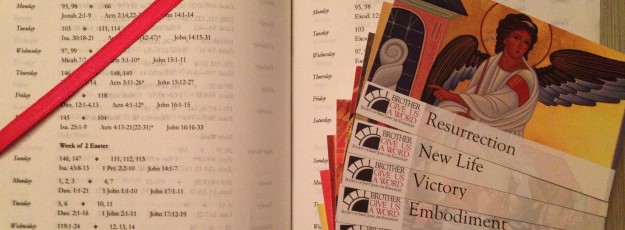But God, who is rich in mercy, out of the great love with which he loved us even when we were dead through our trespasses, made us alive together with Christ– by grace you have been saved– and raised us up with him and seated us with him in the heavenly places in Christ Jesus, so that in the ages to come he might show the immeasurable riches of his grace in kindness toward us in Christ Jesus. For by grace you have been saved through faith, and this is not your own doing; it is the gift of God– not the result of works, so that no one may boast. For we are what he has made us, created in Christ Jesus for good works, which God prepared beforehand to be our way of life. (Ephesians 2:4-10)
We are what he has made us
In the Daily Office is we read the Scriptures and respond to them. We do not simply listen to the words of God day after day; we speak back to God in words spoken by Christians over the centuries.
So this morning we do not just read Paul’s letter to the Ephesians, where he reminds them that they are “alive together with Christ,” a new creation in Christ by God’s grace.
We also respond to God, saying “Splendor and honor and kingly power are yours by right, O Lord our God.”
That response is in Canticle 18, one of the two appointed for Friday mornings, and it helps us understand why we offer praise.
- God created everything that is
- By his will they continue to exist
- Christ — the Lamb that was slain — has redeemed us for God
- That redemption is for all people on earth, who rightly offer to God “worship and praise, dominion and splendor, for ever and for evermore.”
We come to understand that through God’s grace we are now the “kingdom of priests” that the Revelation to John describes (Rev. 5:9-13).
Created in Christ Jesus for good works
But we exercise our royal priesthood not just by praising God in the Daily Office, or at the Eucharist, or in our private prayers.
We are a kingdom of priests “created in Christ Jesus for good works.”
Whatever those good works may be, from organized programs to individual acts of charity and kindness, we Christians offer them to people in order to communicate hope.
Our Christian hope comes in large part from knowing that we fit into a larger story of meaning and purpose — what the Collect for Fridays calls “none other than the way of life and peace” (BCP 99).
We serve those who are suffering by entering with them into their experience, and we remind them by our actions that their “way of the cross” is not the end of the story. This is the wisdom of recovery work, for example. We witness to God’s power in our lives by the example of our own suffering and healing.
We serve those who struggle by helping them see how everything is shot through with God’s presence, even when it seems darkest and even if the glimpse we offer is faint.
In the meantime
Ascensiontide, as the Church calls the time between Ascension Day and Pentecost, is an “in-between time” for the first disciples.
Jesus has left them — he “ascended far above the heavens that he might fill all things” (BCP 226) — but it’s not the Day of Pentecost yet, and the disciples haven’t yet received the power of the Holy Spirit that he promised.
Many people around us live in that “in-between time” all the time.
They have lost a spouse or a friend or a job, or they themselves feel lost, and they cannot imagine life any differently. They may have no sense of promise for new relationships or they may feel powerless over their circumstances; they have lost hope.
Like Jesus, we minister most effectively when we enter into people’s lives and show them what transformation can look like. In his incarnation Jesus entered into our human lives, and by his dying and rising he shows us the divine life we are created for.
We are a kingdom of priests in the meantime. We praise God for keeping his promise and we perform the good works we are created for in order to give God’s people (that is, all people) the promise of hope.
Almighty God, whose blessed Son our Savior Jesus Christ ascended far above all heavens that he might fill all things: Mercifully give us faith to perceive that, according to his promise, he abides with his Church on earth, even to the end of the ages; through Jesus Christ our Lord, who lives and reigns with you and the Holy Spirit, one God, in glory everlasting. Amen. (BCP 226)








